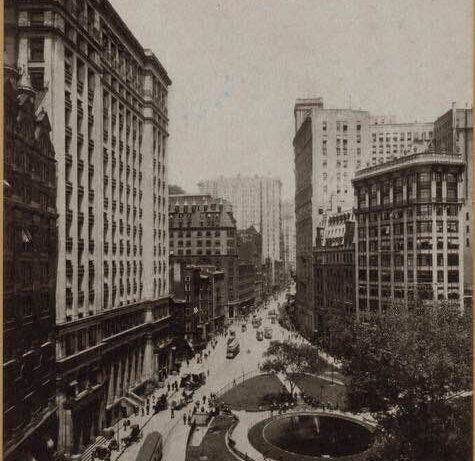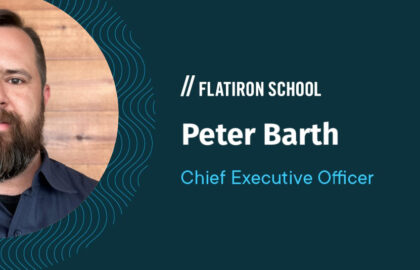Time travel: thanks to Flatiron School alumna Christina Leuci, there’s an app for that. Along with her co-creator Orion Breaux, Leuci built and launched the OldNYC mobile app, which gives users access to the vast photographic history of New York City.
While OldNYC has existed since May 2015 as a website that allows visitors to view the New York Public Library’s collection of historical photographs of New York City from the 1870’s to 1970’s, Leuci and Breax have taken the user experience a step further with their mobile app: they’ve created an augmented reality experience in which users can see historical photographs of New York City on their phone based on their real-time location. So as you explore the streets of New York City’s five boroughs, simply opening the OldNYC app pulls back the years of development around you, showing you historical photographs from right where you’re standing; if you walk a few blocks over, the interactive map updates to show you entirely different snapshots of the city, along with dates and information about the photographs, to reflect your new location. Here’s a peek at what you’ll see walking around the Flatiron School:
While their goal for the app, according to Breaux, is to eventually allow users to “augment reality by pointing their phones at any location to see ‘what was there,’ like a historical x-ray vision for the city,” they’re currently thrilled to be giving users something extra out of a walk through New York City.
Breaux is a product manager at LiveAuctioneers, helping the company with user growth. Leuci, since finishing Flatiron School’s full-stack web development immersive, has been working as a software developer, most recently at Cyrus Innovation, helping companies build and scale software products. The opportunity to build the OldNYC app came spontaneously. As fans of the intersection of history, maps, and technology they had already been following the web version of OldNYC. When OldNYC creator Dan Vanderkam sent a mass email to his mailing list to ask if anyone wanted to build a mobile app for the site, Breaux and Leuci jumped at the chance. Despite the fact that this would be their first mobile app, they were confident that they could learn quickly enough to make a great app to complement the site.
Their process for building the app started with a question: ‘‘How can we use the mobile platform to enable an experience not possible on a regular desktop website?” Breaux says to the New York Public Library, “From the beginning, we had this vision where you could walk down a street and easily access historical photos nearest to your location. Like a self-guided historical tour, where you’re encouraged to discover ‘what was there’ anywhere you go.”
Breaux and Leuci then worked backwards from that question, breaking down the design, development, and research steps that needed to be taken. They started by focusing on foundational features: map navigation, photo viewing, and the ability for users to re-center the map on their locations. Leuci says, “We did several iterations of wireframes on paper, thinking about how the user would interact with each of these features. From there, mocking up the experience in Sketch, a digital design tool, helped us refine the user interface and interactions further.”
Of course, the pair spent most of their time coding the app—which was no small feat considering they were both new to iOS development. However, Leuci explains, her experience with web development at Flatiron School laid the groundwork for their iOS self-education: “My coding experience began with Java so the jump to Swift wasn’t a huge chasm syntax-wise. Additionally, having a concrete understanding of Ruby on Rails made it extremely easy to create associations for how to organize the object-oriented back-end.”
For Leuci, the most interesting element of app is the discussion that can arise from resurfacing these pieces of history. Leuci says, “By exploring photos from New York City’s past, you really get a sense of the society that was present from the late 1800s into the early 1900s and how it has changed throughout the years. People are now able to step through the city’s life and watch as it has grown and changed into the metropolis it is now. Can you imagine, hearing stories from your Grandmother who lived in New York City in the 1930s and being able to find the intersection she lived at and explore that photo in detail?”
With that in mind, Leuci and Breaux’s future plans for the app include incorporating more photographs, expanding the app’s dataset further into both the past and future—from lithographs from the 1600s all the way up to a crisp digital photo of a skyscraper—as well as creating features like the ability to comment on photos so that users across generations can add their own stories to the photographs.
“Imagine walking around the city with the ability to explore every facet of your current location’s history!” says Leuci.
Feeling inspired to learn how to build your own app? There’s no better way to get started than signing up for Flatiron School’s free Intro to Programming course. And be sure to download the free OldNYC mobile app!




